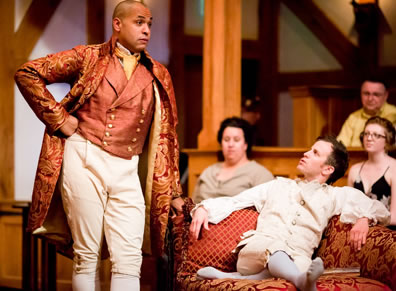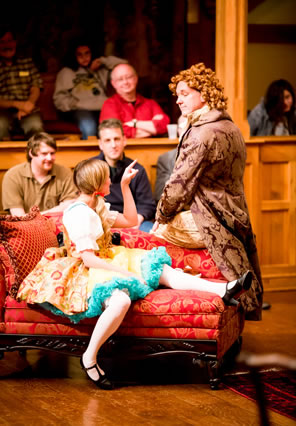Love for Love
A Valentine
By William Congreve
American Shakespeare Center, Blackfriars Playhouse, Staunton, Virginia
Saturday, March 19, 2016, D–7&8 (center stalls)
Actors' Renaissance Season

Scandal (René Thornton Jr., left) talks with his friend Valentine (Chris Johnston) in William Congreve's Love for Love. at the Blackfriars Playhouse. Below, Tattle (John Harrell) teaches country girl Prue (Lauren Ballard) how to make love in high society romance. Photos by Lindsey Walters, American Shakespere Center.
One of the keys to the American Shakespeare Center's ability to stage a singularly good production of the modern rock musical Bloody Bloody Andrew Jackson, currently playing at the Blackfriars Playhouse, is that show's music director, Chris Johnston. While Johnston has long been a musical force of talent for the American Shakespeare Center (ASC) the past seven years that we've been attending plays at its Blackfriars Playhouse in Staunton, Virginia, he also has been developing as a major acting talent in a company of incomparable theatrical capabilities.
If there were an ultimate “arrival” moment for Johnston as an actor, it was his work during this past winter's Actors' Renaissance Season when the company of actors without a director or production team and with abbreviated rehearsal times (generally a week per play) stages five plays in repertory. Johnston was astounding as Ariel in William Shakespeare's The Tempest (guitar ever at the ready) and stole the show with his comical Lucio in Shakespeare's Measure for Measure. He showed his dramatic chops as the incestuous hothead Hippolito in Thomas Middleton's Women Beware Women, and he played multiple roles, including one of the Amazons, in the powerhouse ensemble piece the company made out of John Fletcher's and Phillip Massinger's The Sea Voyage. The season culminated with William Congreve's Love for Love with Johnston in the lead role of Valentine.
I never got around to writing my review of Love for Love, waylaid in the shuffle of this mortal coil. Having just posted my applause of Johnston in Bloody Bloody Andrew Jackson (he also plays a memorable Woodie Guthrie–like Feste in the company's current production of Twelfth Night), I felt this was a good time to try to decipher my scribbled notes from Love for Love and write this review. Admittedly, I don't have a lot of notes to decipher. I waxed enthusiastically about this company's ensemble efforts through the first four plays of the Renaissance Season, but Love for Love didn't quite coalesce into a satisfying production.
I'll lay some responsibility on the play itself. Not that Congreve didn't write a fine piece of work with Love for Love; rather, it's a kind of work that fights the Ren Season methodology and madness. The spurious plot centers on Valentine, who has spent all of his money courting Angelica (Lexi Braverman, as a socially astute but true-hearted heiress), trying to secure his inheritance and still get the girl, too. His father, Sir Sampson Legend (a bombastically gruff Jonathan Holtzman), plans to pay off his son's debts in return for getting him to sign away his inheritance to his younger brother, the seaman Ben (a brusque, man's man in Benjamin Reed). Angelica's superstitious old uncle, astrology fanatic Foresight (Aidan O'Reilly in straggly long gray hair, Fu Manchu, floor-length robe, and up-pointed shoes), is maneuvering to marry Prue, his stupid daughter from his first marriage (Lauren Ballard, who plays wide-eyed stupid well), to Ben. However, Foresight becomes obsessed with the possibility that his new wife (Allison Glenzer) is having an affair. She is, with Valentine's friend, the aptly named Scandal played by René Thornton Jr. Meanwhile, Mrs. Foresight teams up with her sister, Mrs. Frail (Ginna Hoben), who wants to hook up with Ben. Yet another aptly named character is Tattle (John Harrell), who is proud of his trysts with women and brags about his discretion in not revealing those trysts.
That last descriptive sentence exemplifies the wittiness that is the heart of Congreve's work, for in order for Tattle to brag about his discretion, he must ultimately be indiscreet, and this trait is both his undoing and the fuel for the other characters to use him as a perpetual jest. The world of the wealthy is Congreve's canvas and, obvious in the names he chooses, stock characters are his palette: the sailor is brash, the country girl is dumb, the beautiful heiress is wise, the romantic lead is true, his gallant buddies are clever, the old fathers are self-centered fools, and the wives are horny for men other than their husbands (Mrs. Frail may have had a dalliance with Tattle, but when at the end they accidentally get married through a trick, she confesses that “for my part I always despised Mr. Tattle of all things; nothing but his being my husband could have made me like him less”).
Congreve's bucket of brushes, however, are a wealth of words, and he applies them with impeccable precision to create an incredible lexical world of shades, shadows, innuendos, and truths. He shows such incredible skill at turning a phrase I enjoyed this play more as a writer appreciating the work of a far superior colleague than as a theater geek watching his superfluous play. Upon Valentine's plan to earn money as a poet, Scandal says, “No, turn pimp, flatterer, quack, lawyer, parson, be chaplain to an atheist, or stallion to an old woman, anything but poet.” Regarding women's virtue, Scandal says, “'Tis as I believe some men are valiant, through fear. For why should a man court danger or a woman shun pleasure?”
Thornton is all charm in his portrayal of Scandal, a man who can insult another to his face and be praised by the dispraised for the wit with which he phrases his insults. He also operates at two levels: a public one of seeming virtue while, at the same time, laying the groundwork for his vice. Scandal is not merely using innuendo—Congreve's wordplay is much richer than that—but the playwright employs an incredible dash of innuendo at other moments, especially as Mrs. Frail makes a play for Ben, who uses seaman's imagery in reply. Hoben makes Mrs. Frail a sly flirt, but post-tryst Hoben escalates her innuendo to an obtuse visual as she comes on stage wearing a ship headdress.
The play's funniest scene, however, is flat-out satire. The two sisters inspire Tattle to make a play for Prue, and in doing so Tattle finds she is far too willing and up-front to reciprocate. So, he first must teach the girl the rules of how people in high society “make love,” starting with her denying that she wants to make love with him. “Why, must I tell a lie then?” she asks. “Yes, if you'd be well-bred. All well-bred persons lie. Besides, you are a woman, you must never speak what you think: your words must contradict your thoughts, but your actions may contradict your words. So when I ask you if you can love me, you must say no, but you must love me, too.… If I ask you to kiss me, you must be angry, but you must not refuse me. If I ask you for more, you must be more angry, but more complying. And as soon as ever I make you say you'll cry out, you must be sure to hold your tongue.” “O lord, I swear this is pure,” Ballard's Prue says excitedly. “I like it better than our old-fashioned country way of speaking one's mind.” What follows is a clumsy application of this tutorial, which Harrell and Ballard execute well.
 Such moments carry the play's comedy, but the whole production doesn't gel. After mastering the two Shakespeare plays at the outset of the season, conquering Women Beware Women, and turning the compositional shipwreck that is The Sea Voyage into comic gold, the actors come to Congreve who, intelligent as his writing may be, doesn't give them much dramatic substance to work with. An insider writing for an insider crowd, Congreve aimed his repartee (no need for real character development) at likeminded wealthy wits—Congreve was pretty much portraying himself in the character of Scandal. The previous productions of the season saw the brilliant meshing of individual actors' visions through the prisms of their own understanding of the characters they were playing, powerful emotional reactions to scenes being worked out on the fly, and a bold willingness as a team to push envelopes in stagecraft; these qualities seem to have been negated by Congreve's precision and limited scope. Perhaps this is a play that would have fared better helmed by a single vision (which is not often the case with Ren Season offerings).
Such moments carry the play's comedy, but the whole production doesn't gel. After mastering the two Shakespeare plays at the outset of the season, conquering Women Beware Women, and turning the compositional shipwreck that is The Sea Voyage into comic gold, the actors come to Congreve who, intelligent as his writing may be, doesn't give them much dramatic substance to work with. An insider writing for an insider crowd, Congreve aimed his repartee (no need for real character development) at likeminded wealthy wits—Congreve was pretty much portraying himself in the character of Scandal. The previous productions of the season saw the brilliant meshing of individual actors' visions through the prisms of their own understanding of the characters they were playing, powerful emotional reactions to scenes being worked out on the fly, and a bold willingness as a team to push envelopes in stagecraft; these qualities seem to have been negated by Congreve's precision and limited scope. Perhaps this is a play that would have fared better helmed by a single vision (which is not often the case with Ren Season offerings).
All that said, Johnston shines particularly bright as Valentine, the only truly emotionally complex role in the play (or, at least, he made it so). His performance starts in fine form even before the play begins, relaxing on a chaise lounge as he coaches his servant, Jeremy (Chad Bradford), through the preshow spiel. With that and through most of the play, Johnston turns his portrayal on many subtle physical expressions and line readings, honing the already precise brushstrokes with which Congreve created his character. The play's plot comes to a climax as Valentine feigns madness to foil his father's attempts to get him to sign his inheritance away, a ploy that also aims to trick Angelica into marrying him. It's an absurd turn of the plot—though it leads to a great line as Sir Sampson Legend worries that "the devil will tell him in a dream that he must not part with his estate, but I'll bring him a parson to tell him that the devil's a liar—or if that won't do, I'll bring a lawyer that shall out-lie the devil." Yet, Johnston sells it, and sells it further when he just as suddenly tries to convince Angelica that he's really not insane, despite Jeremy continuing the scam. Only when Valentine, finally convinced that Angelica will never return his love, decides to sign away his inheritance—ironically proving his purposes were not mercenary—does she realize the depth of his love. It's a convoluted plot twist, but one that Johnston's nuanced portrayal anchors.
Over the past few years writing about ASC productions at the Blackfriars, I've been increasingly advocating for Johnston to be given his shot at a Hamlet, Hal, Henry, or Iago. When given difficult lead roles in the Renaissance Season (last year he took on Flamineo in John Webster's The White Devil), he soars with it. This year in which, among an outstanding troupe of actors who achieved indelible portrayals—Thornton's Prospero, Ballard's Miranda, Bradford's Ferdinand, Glenzer's Isabelle, Harrell's Duke of Vienna, Patrick Midgley's Pompey, Hoben's Livia, and everybody's sea voyagers—Johnston as Ariel, Lucio, Hippolito, Juletta the Amazon, and now Valentine was the brightest star of all.
Eric Minton
August 13, 2016
Comment: e-mail [email protected]
Start a discussion in the Bardroom



 Find additional Shakespeareances
Find additional Shakespeareances